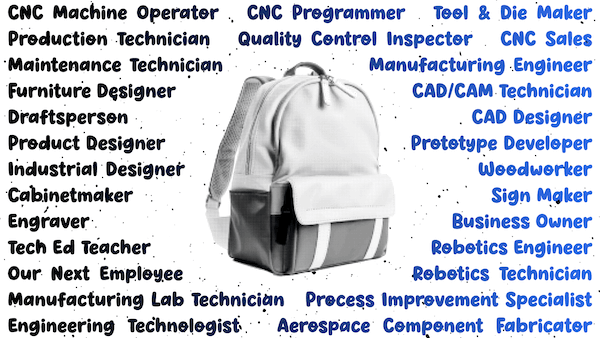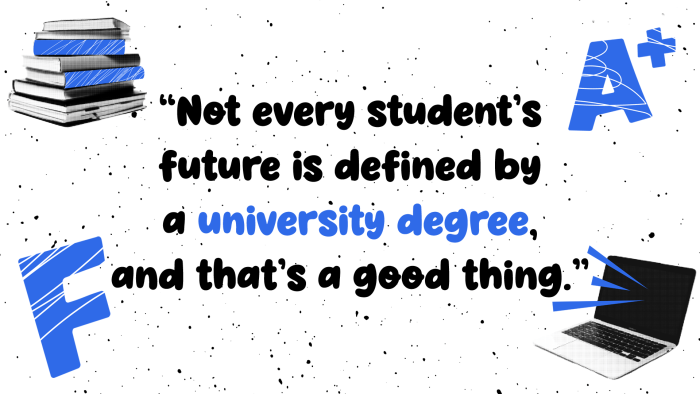Do We Just Talk A Big Game?
We talk a lot about using CAD and CNC in the classroom to teach hireable skills, but is that just a cleaver marketing strategy, or can we back up that claim?
Where do students go once they’ve mastered toolpaths, machine setup, and CAM workflows?
Is digital manufacturing a growing industry, or merely a niche?
And how does a program like EMPOWER[ED] ACADEMY bridge the gap between training and employment?

Turning Skills into Opportunity
When a student learns to work with modern CNC systems, they aren’t just learning how to press a button. Yes, this is digital manufacturing being operated by a computer, but there is a lot more to it than that. They are developing a blend of technical skills and problem-solving mindset that employers across multiple industries are actively seeking. After learning the fundamentals of CAD software, CNC machine operation, and CAM strategies, students become a prime candidate for:
-
Operators & machinists in manufacturing. Whether producing fixtures, aerospace parts, medical components, or machine tooling, CNC-trained individuals are needed to run, setup, and maintain modern CNC systems. As robotics continue to expand exponentially in manufacturing, we need operators more than ever. In the U.S. alone, there are over 299,000 machinists and tool & die makers (according to the Bureau of Labor in May 2024).
-
CAD/CAM technicians who prepare models, generate toolpaths, simulate jobs, optimize machining strategies, and support production teams. Many small and mid-sized manufacturers hire techs to bridge design and manufacturing processes. In 2021, there were over 55,000 CAD designers in the USA, and it is one of the fastest-growing industries in the world.
-
Entrepreneurs and makers. Skilled students can launch small CNC-driven businesses – for signage, furniture parts, custom woodwork, or industrial components, leveraging their CAD/CAM knowledge to produce higher-value, repeatable products. The online woodworking community is massive, and continues to grow daily. We have so many stories of friends who have left the 9-5 lifestyle to start their own small business, driven by CNC.
-
Education and training roles. Having classroom-ready CNC knowledge positions educators, lab technicians, and training specialists to support others in STEM/CTE programs, workforce development centres, or community colleges. Participation in university is declining exponentially, and there is a growing need for educators within the trades; A report on the U.S. indicates that at least 26 states have reported shortages of Career & Technical Education (CTE) teachers for the 2025-26 school year.

How EMPOWER[ED] ACADEMY Bridges Classroom to Career
At Simply Technologies, we believe it’s not enough just to introduce CAD and CNC in class; teachers (and students) need a structured path into the workforce. That’s exactly why we created EMPOWER[ED] ACADEMY. The 16-session course covers:
-
Foundations of CAD software like Vectric – so students can confidently design parts.
-
Toolpath creation, material setup, and machining strategies – so students know how to execute production-ready jobs
-
Machine operation, safety compliance, and workflow optimization – so students understand how professionals keep machines running safely, and projects profitable.
-
Curriculum resources (PowerPoint presentations, lesson guides) – so educators can build repeatable programs that track skills, assess performance, and prepare students for credentials. And most importantly, it bridges the gap with staff turnover.
By linking classroom training with real-world application, students move from simply “learning CNC” to “I can produce parts, solve problems, and contribute in a manufacturing or design environment”. Shop class is no longer just a credit that gets you closer to graduation, it is the introduction to career paths than many students would have never considered.
Not every student’s future is defined by a university degree – and that’s a good thing. Many young people are realizing that success doesn’t come from fitting into the traditional, one-size-fits-all model of education. Some learn best by doing, by creating, and by solving real-world problems with their hands and minds. The skilled trades are becoming an increasingly vital path – offering stable, high-paying, and fulfilling careers in industries that are desperate for new talent. As society rediscovers the value of makers, builders, and technicians, programs like EMPOWER[ED] ACADEMY help bridge that gap, turning classroom curiosity into career-ready capability.
At Simply Technologies, we’re committed to helping schools deliver programs that matter. Because CNC isn’t just about machines – it’s about people, skills, and future jobs.
Let’s prepare the next generation – together.
Peace & Grace,
Jeremy Stevenson
